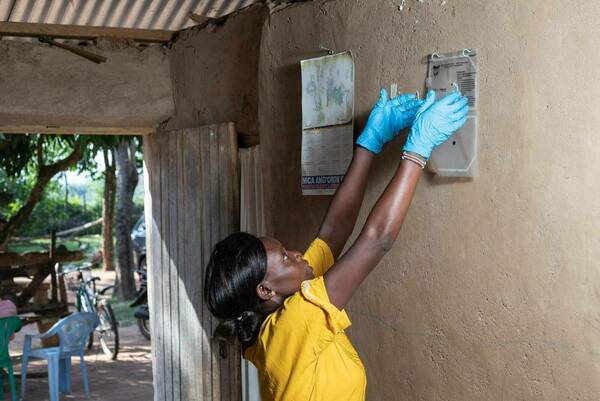Sara Berger named as new IBM director of the Notre Dame–IBM Technology Ethics Lab

The Notre Dame–IBM Technology Ethics Lab, a critical component of the Institute for Ethics and the Common Good (ECG) and the Notre Dame Ethics Initiative, welcomes Sara Berger as the new IBM director of the Tech Ethics Lab. In addition to her role with the Lab, Berger is also a senior research scientist with the Responsible Technologies Group at IBM Research.
“Sara is a perfect fit for this role,” said Adam Kronk, ECG's director of research and external engagement. “Her research work with IBM has been driven by the same engine that fuels the Lab—a commitment to the critical importance of ethical, human-centered development and use of technology. With the support of the university-wide Ethics Initiative, Notre Dame is experiencing exciting, fast-paced growth in the field of ethics. Our multi-year partnership with IBM on the Tech Ethics Lab is one of the primary reasons for this momentum, and I know that Sara's multidisciplinary research expertise will keep us moving in the right direction.”
As the IBM director of the Tech Ethics Lab, Berger will work with the Lab’s Notre Dame staff, affiliated faculty, and graduate fellows to create collaborative opportunities for researchers, academics, and industry professionals. Her role will focus on promoting interdisciplinary discussions and research pertaining to responsible innovation and governance in technology. Such collaborations are intended to not only foster essential community-building across sectors and disciplines, but also generate actionable recommendations and interventions for real-world technology and policy challenges.
Berger holds a doctorate in systems and cognitive neuroscience from Northwestern University, with a subspecialty in medical humanities and bioethics. She has conducted extensive research on pain and pain perception in humans and animals, using that experience to design and implement technology and research protocols that collect more nuanced, patient-centric pain measurements and promote easier access to treatment and care. Her research includes investigating ethical issues at the intersection of AI and neurotechnologies, with a focus on addressing practical challenges to neurodata classification, sharing, and use. She has recently conducted research on evaluations of large language models (LLMs) and conceptualizations of safety in AI assessments. Her multidisciplinary interests have been instrumental in her creation of research methods and tools that support the responsible creation and use of technologies, and her work both prioritizes and champions collaboration and exposure to multiple ways of thinking and doing.
Berger made her first trip to Notre Dame’s campus for the Tech Ethics Forum, hosted by the Tech Ethics Lab in late January. During the Forum, she had the opportunity to meet with more than 60 researchers from Notre Dame and throughout the world who had received funding as part of the Lab’s 2024 CFPs, which focused on LLMs and the ongoing efforts to navigate LLM use responsibly.
"I couldn't be more excited to join the Notre Dame–IBM Tech Ethics Lab,” said Berger. “These kinds of collaborations between academia and industry, as well as between disciplines, help us think more holistically and intentionally about the ethical, legal, and social implications of technology. And they allow us to imagine and design alternative futures for what technology might look like, do, or not do in our lives moving forward."
…
The Notre Dame–IBM Technology Ethics Lab, a critical component of the Institute for Ethics and the Common Good and the Notre Dame Ethics Initiative, promotes interdisciplinary research and policy leadership in technology ethics and is supported by a $20-million investment from IBM.
Originally published by at ethics.nd.edu on February 12, 2025.
Latest Research
- NSF Cyber SMART’s fall meeting shapes fifth year of project, legacy and future plans, and adds new memberThe U.S. National Science Foundation (NSF) Cyber SMART center gathered for its fall meeting on the University of Notre Dame campus this September. The meeting served as a checkpoint with progress reports and new projects from research leads and students…
- Slavic and Eurasian studies professor wins Humboldt fellowship to research how Russia’s religious past shapes its presentWhen Russia invaded Ukraine on Feb. 24, 2022, Sean Griffin realized his second book needed a new title. Griffin, an associate professor in the University of Notre Dame’s Department of…
- Notre Dame’s R.I.S.E. AI Conference builds interdisciplinary collaboration to inform human-centered artificial intelligenceAs artificial intelligence (AI) transforms nearly every sector of society — from healthcare and education to governance and global development — a critical question emerges: How can we conscientiously design and deploy these powerful technologies to positively impact society? This…
- University of Notre Dame joins the Global Coalition of Ukrainian StudiesThe University of Notre Dame has joined the Global Coalition of Ukrainian Studies after signing a Memorandum of Cooperation (MOC), formalized on September 24, 2025, at the Ukrainian Institute of America in New York City. Notre Dame joined four other American…
- The University of Notre Dame’s Mendoza College of Business and Industry Labs team up to inspire national security manufacturing competitiveness in the regionThe South Bend - Elkhart Region is full of manufacturing companies that are poised to grow, and Executive Master of Business Administration (EMBA) and Master of Business Administration (MBA) students at the University of Notre Dame are finding innovative ways to contribute to that growth. Earlier…
- Notre Dame research informs WHO conditional recommendation for spatial repellents in malaria vector controlThe World Health Organization (WHO) recently announced a “conditional recommendation” for spatial emanators, also known as “spatial repellents,” in the fight against malaria. This key determination was informed by spatial repellent studies that included the Advancing Evidence for the Global Implementation of Spatial Repellents (AEGIS) Project in Kenya, led by the University of Notre Dame and funded by Unitaid. The findings from this particular study were recently published in The Lancet.













